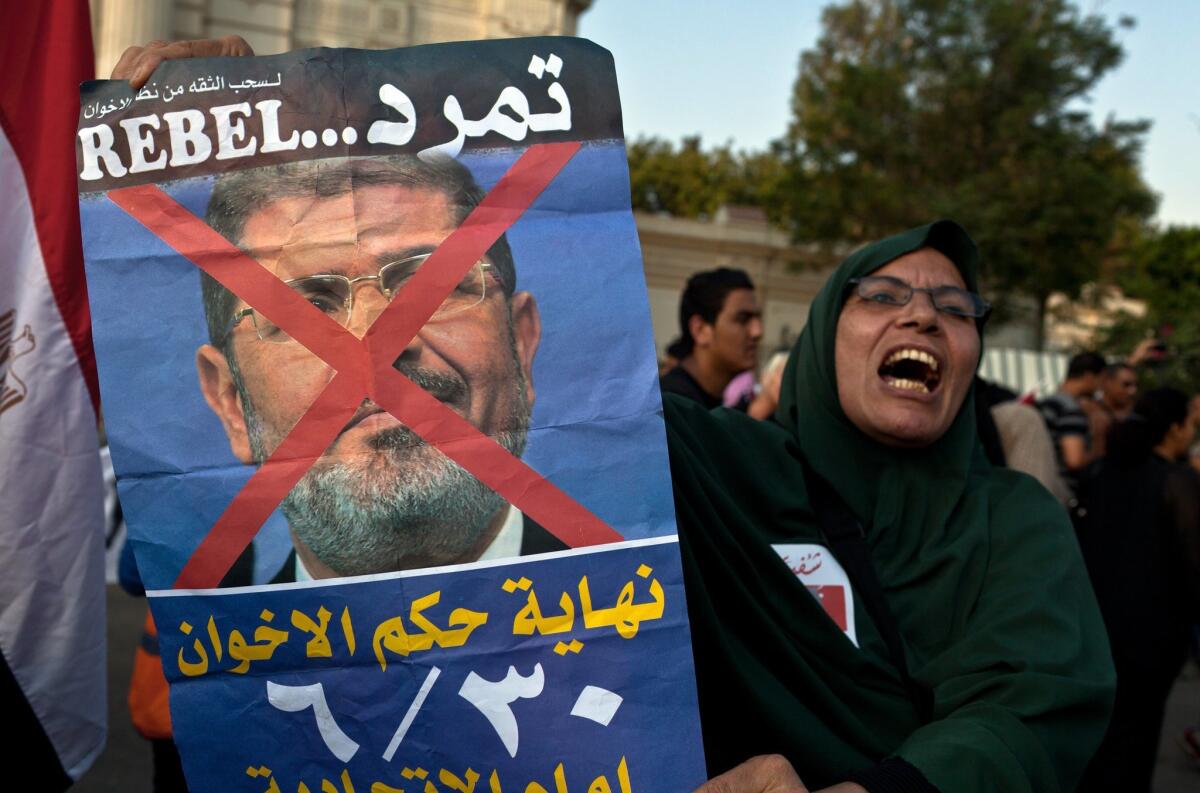Egypt’s President Mohamed Morsi refuses to step down

- Share via
CAIRO -- President Mohamed Morsi on Tuesday refused to yield to an army ultimatum to form a coalition government by the next day or face a military-imposed solution to end months of unrest, saying he would protect the legitimacy of the constitution even to his death.
In a rambling, defiant address that stretched into early Wednesday, Morsi said it was “unacceptable” for the president to be dictated to. He repeated calls for national dialogue but offered no significant concessions to antigovernment protesters who took to the streets for a fifth day.
“Mohamed Morsi has never been adamant about clinging to the seat of power,” he said. “However, I was elected by the people in fair and transparent elections ... a state is in place. I have no other option. I shoulder the responsibility.”
PHOTOS: Massive protest against President Morsi in Egypt
Morsi’s address came as his Islamist supporters have been clashing with protesters in Alexandria and other cities.
The scene is reminiscent of two years ago, when an uprising toppled Hosni Mubarak only to leave a divided political landscape with no cohesive voice for a new Egypt. The army, as it may do in coming days, stepped in then with popular support only to retreat 17 months later with a bruised reputation after mass arrests and civil rights violations.
Headlines in the country’s newspapers read: “Last 48 Hours of Muslim Brotherhood Rule” and “Egypt Awaits the Army.”
The clock is ticking, Morsi is isolated and his Muslim Brotherhood movement is seething at the prospect that its decades-old quest to rule the country may disintegrate. At least five Cabinet officials have resigned, including the defection Tuesday of Foreign Minister Mohamed Kamel Amr.
The political circle was tightened further by a court ruling that ordered the removal of Morsi ally Talaat Ibrahim Abdallah as top prosecutor. The courts have been battling the president for months to stem the Brotherhood’s Islamist agenda for the government.
In an earlier statement Tuesday, Morsi said his office was not consulted by the military Monday when Gen. Abdel Fattah Sisi, defense minister and chief of the armed forces, issued the ultimatum. The president suggested the move was an affront to democracy that “may cause confusion” among Egyptians, though many here would welcome the military stepping in to end the chaos.
Morsi and Sisi met Tuesday in an effort to resolve the crisis. During his national address hours later, the president reached out to disenfranchised young people, blamed holdovers from the old government for instigating unrest and told Egyptians “not to allow the revolution to be hijacked under any pretext.”
“Remnants of the former regime are fighting against democracy … sucking up the blood of the people and gobbling up riches,” he said.
ALSO:
Palestinian shot dead by Israeli forces in the West Bank
Latest rocket failure spurs concern about Russia’s space program
Nelson Mandela’s family battles in court as he remains critically ill
Hassieb is a special correspondent
More to Read
Sign up for Essential California
The most important California stories and recommendations in your inbox every morning.
You may occasionally receive promotional content from the Los Angeles Times.














